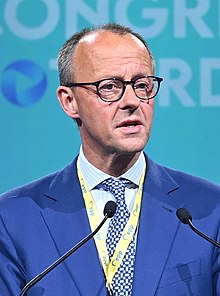| No. |
Image |
Name
(Birth–Death) |
Party |
Term of office |
Chancellor |
| Took office |
Left office |
Term Length |
| 1 |
 |
Kurt Schumacher
(1895–1952) |
|
Social Democratic Party
(SPD) |
7 September 1949 |
20 August 1952 |
2 years, 348 days |
Konrad Adenauer |
| 2 |
 |
Erich Ollenhauer
(1901–1963) |
|
Social Democratic Party
(SPD) |
27 September 1952 |
14 December 1963 |
11 years, 78 days |
Konrad Adenauer
Ludwig Erhard |
| 3 |
 |
Fritz Erler
(1913–1967) |
|
Social Democratic Party
(SPD) |
1963 |
1966 |
2 years, 273 days |
Ludwig Erhard |
| 4 |
 |
Knut Freiherr von Kühlmann-Stumm
(1916–1977) |
|
Free Democratic Party
(FDP) |
1 December 1966 |
23 January 1968 |
1 year, 53 days |
Kurt Georg Kiesinger |
| 5 |
 |
Wolfgang Mischnick
(1921–2002) |
|
Free Democratic Party
(FDP) |
23 January 1968 |
22 November 1969 |
1 year, 272 days |
Kurt Georg Kiesinger |
| 6 |
 |
Rainer Barzel
(1924–2006) |
|
Christian Democratic Union
(CDU) |
22 November 1969 |
17 May 1973 |
3 years, 207 days |
Willy Brandt |
| 7 |
 |
Karl Carstens
(1914–1992) |
|
Christian Democratic Union
(CDU) |
17 May 1973 |
13 September 1976 |
3 years, 119 days |
Willy Brandt
Helmut Schmidt |
| 8 |
 |
Helmut Kohl
(1930–2017) |
|
Christian Democratic Union
(CDU) |
13 September 1976 |
1 October 1982 |
6 years, 18 days |
Helmut Schmidt |
| 9 |
 |
Herbert Wehner
(1906–1990) |
|
Social Democratic Party
(SPD) |
1 October 1982 |
8 March 1983 |
1 year, 158 days |
Helmut Kohl |
| 10 |
 |
Hans-Jochen Vogel
(1926–2020) |
|
Social Democratic Party
(SPD) |
8 March 1983 |
12 November 1991 |
8 years, 249 days |
Helmut Kohl |
| 11 |
 |
Hans-Ulrich Klose
(1937–2023) |
|
Social Democratic Party
(SPD) |
12 November 1991 |
10 November 1994 |
2 years, 363 days |
Helmut Kohl |
| 12 |
 |
Rudolf Scharping
(born 1947) |
|
Social Democratic Party
(SPD) |
10 November 1994 |
27 October 1998 |
3 years, 351 days |
Helmut Kohl |
| 13 |
 |
Wolfgang Schäuble
(1942–2023) |
|
Christian Democratic Union
(CDU) |
27 October 1998 |
29 February 2000 |
1 year, 125 days |
Gerhard Schröder |
| 14 |
 |
Friedrich Merz
(born 1955) |
|
Christian Democratic Union
(CDU) |
29 February 2000 |
22 September 2002 |
2 years, 206 days |
Gerhard Schröder |
| 15 |
 |
Angela Merkel
(born 1954) |
|
Christian Democratic Union
(CDU) |
22 September 2002 |
22 November 2005 |
3 years, 61 days |
Gerhard Schröder |
| 16 |
 |
Wolfgang Gerhardt
(born 1943) |
|
Free Democratic Party
(FDP) |
22 November 2005 |
1 May 2006 |
160 days |
Angela Merkel |
| 17 |
 |
Guido Westerwelle
(1961–2016) |
|
Free Democratic Party
(FDP) |
1 May 2006 |
28 October 2009 |
3 years, 180 days |
Angela Merkel |
| 18 |
 |
Frank-Walter Steinmeier
(born 1956) |
|
Social Democratic Party
(SPD) |
28 October 2009 |
16 December 2013 |
4 years, 49 days |
Angela Merkel |
| 19 |
 |
Joachim Poß[note 1]
(born 1948) |
|
Social Democratic Party
(SPD) |
23 August 2010 |
26 October 2010 |
64 days |
Angela Merkel |
| 20 |
 |
Gregor Gysi
(born 1948) |
|
The Left |
17 December 2013 |
12 October 2015 |
1 year, 299 days |
Angela Merkel |
| 21 |
 |
Dietmar Bartsch
(born 1958)
Sahra Wagenknecht
(born 1969) |
|
The Left |
12 October 2015 |
24 October 2017 |
2 years, 12 days |
Angela Merkel |
| 22 |
 |
Alexander Gauland
(born 1941)
Alice Weidel
(born 1979) |
|
Alternative for Germany
(AfD) |
24 October 2017 |
26 October 2021[lower-alpha 1] |
4 years, 2 days |
Angela Merkel |
| 23 |
 |
Ralph Brinkhaus
(born 1968) |
|
Christian Democratic Union
(CDU) |
8 December 2021 |
15 February 2022 |
69 days |
Olaf Scholz |
24
(14) |
 |
Friedrich Merz
(born 1955) |
|
Christian Democratic Union
(CDU) |
15 February 2022 |
Incumbent |
2 years, 64 days |
Olaf Scholz |
|






















